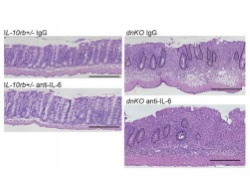IL-6 Hasar sonrası İntestinal EpitelProliferasiyonu ve Tamirini Uyarır
PLoS One. 2014 Dec 5;9(12):e114195. doi: 10.1371/journal.pone.0114195. eCollection 2014.
The authors hypothesized that IL-6 may have beneficial properties in wound response/repair, surmising that the timing of the therapy with respect to injury was the critical factor that needed to be investigated. Using two murine models of bowel injury – wound by biopsy and bacterial triggered colitis, the investigators demonstrated that IL-6 is induced soon after bowel injury by multiple cell types including intraepithelial lymphocytes. Additionally, inhibition of IL-6 resulted in impaired wound healing due to decreased epithelial proliferation. Findings from these studies demonstrate a beneficial role of IL-6 for intestinal wound healing early after injury.

